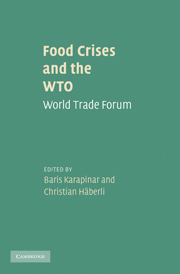Book contents
- Frontmatter
- Contents
- List of contributors
- List of figures
- List of tables
- List of abbreviations
- Preface
- 1 Introduction: food crises and the WTO
- PART 1 Economics of the food crisis
- PART 2 Trade and law: WTO and beyond
- 7 Agricultural policies: past, present and prospective under Doha
- 8 The food crisis and the role of the EC's Common Agricultural Policy
- 9 WTO disciplines and economic dimensions of the 2008 US Farm Bill
- 10 Impact of the food crisis on developing countries and implications for agricultural trade policy
- 11 Responses by the international trade and aid community to food security
- 12 Food security and WTO rules
- 13 Conclusions and policy recommendations
- Index
- References
11 - Responses by the international trade and aid community to food security
from PART 2 - Trade and law: WTO and beyond
Published online by Cambridge University Press: 12 May 2010
- Frontmatter
- Contents
- List of contributors
- List of figures
- List of tables
- List of abbreviations
- Preface
- 1 Introduction: food crises and the WTO
- PART 1 Economics of the food crisis
- PART 2 Trade and law: WTO and beyond
- 7 Agricultural policies: past, present and prospective under Doha
- 8 The food crisis and the role of the EC's Common Agricultural Policy
- 9 WTO disciplines and economic dimensions of the 2008 US Farm Bill
- 10 Impact of the food crisis on developing countries and implications for agricultural trade policy
- 11 Responses by the international trade and aid community to food security
- 12 Food security and WTO rules
- 13 Conclusions and policy recommendations
- Index
- References
Summary
Introduction
This chapter assesses the origins of the food price rises in the context of the international trade-distorting policies (including through food aid), global food markets and food price developments and trends. Recognising that the policy response to higher food prices requires both a short and longer term perspective, this chapter looks at both the efficacy of immediate mechanisms (notably food aid both in kind and in cash, including the impact on domestic production incentives) and at medium to longer term support of agricultural development and trade.
The short-term policy dimension needs to be set in the context of the ‘right to food for the truly needy’. Although the issue of food security arguably lies outside the remit of the WTO and the scope of regional trade arrangements, it is unsurprising that, without reliable and effective support mechanisms, countries will look to trade policy instruments to address food and livelihood concerns. This chapter reviews the adequacy of existing food aid instruments and trade policy rules and measures. It recognises that support to a global system, which progressively seeks to liberalise trade in agriculture, is severely compromised by the lack of a credible and predictable system of support.
The author proposes and recommends a serious reflection on and assessment of the need for a stand-alone emergency mechanism that is cash based and determined ex ante by criteria reflective of global prices of staple foods and malnutrition and famine indicators and therefore not linked to (i.e. decoupled from) trade liberalisation in agriculture (unlike the ‘Marrakesh Decision’).
- Type
- Chapter
- Information
- Food Crises and the WTOWorld Trade Forum, pp. 273 - 296Publisher: Cambridge University PressPrint publication year: 2010

